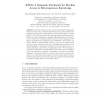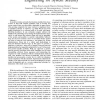247 search results - page 25 / 50 » Characteristics of Modern System Implementation Languages |
RR
2010
Springer
13 years 6 months ago
2010
Springer
Semantic wikis and other modern knowledge management systems deviate from traditional knowledge bases in that information ranges from unstructured (wiki pages) over semi-formal (ta...
IJCAI
1993
13 years 9 months ago
1993
A student model description language and its synthesis method are presented. The language called SMDL is based on a logic programming language taking 4 truth values such as true, ...
IEEEPACT
2008
IEEE
14 years 2 months ago
2008
IEEE
Achieving good performance on a modern machine with a multi-level memory hierarchy, and in particular on a machine with software-managed memories, requires precise tuning of progr...
ICC
2007
IEEE
14 years 2 months ago
2007
IEEE
— In modern wireless networks the functions included into layer II have to deal with complex problems, such as security and access control, that were previously demanded to upper...
AINA
2009
IEEE
14 years 2 months ago
2009
IEEE
One of the novel benefits of virtualization is the ability to emulate many hosts with a single physical machine. This approach is often used to support at-scale testing for large...


